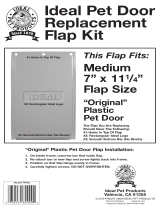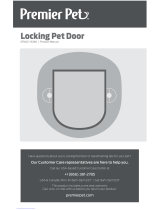
IMPORTANT! READ AND FOLLOW THESE INSTRUCTIONS
CAREFULLY AND KEEP FOR FUTURE REFERENCE.
Product Codes:
#1158, #1159
Ultra Clear
PET DOOR
Training - Dogs
1. Use a handful of your dog’s favourite treats, get your dog excited about the treats by letting
them sni and lick the treats without actually giving them one.
2. Before starting your training, assess whether your dog would be more motivated to come in
through the pet door or go out through it. If your dog loves being inside the house, you should
start this training with them outside. If they’re always excited to get a chance to get outside,
start with them inside the house.
3. With your dog on one side of the pet door and you on the other, lift the flap of the pet door all
the way up and call them, using an excited voice and lots of animation. Wave the treats so they
can see them on the other side of the pet door. Reward any attempt to come toward or through
the door with lots of verbal encouragement, but don’t let them have the treat until they make it
the whole way through.
4. When they come all the way through, pet and praise them and give them some treats! Then,
leaving them where they are, go to the other side of the pet door, lift the flap and repeat the
same exercise. Do a few repetitions going each way then take a break. This training can be
stressful and exciting for your dog, so you should do short sessions to avoid burning them out.
5. After your dog has had a break, repeat the exercise. If they’re coming through with no hesitation,
repeat the exercise holding the flap up only halfway. Your dog may be troubled by feeling the
flap touching them, so you’ll need to use lots of verbal encouragement to convince them that it’s
no big deal.
6. Once they’re going through with the flap halfway up, continue doing short sessions with them,
gradually lifting the flap up less and less, until you’re to the point where they’re pushing through
the door on their own.
7. Now try to get them to do it without you calling and oering them treats. You can do this by
leaving them on one side of the door and scattering some treats on the ground on the other side
of the door. If your dog comes out on their own, you’ll know they’re getting the idea. Repeat this
for a few sessions, and you’ll soon find that your dog’s using the pet door on their own.
Training - Cats
1. Cats are smart when it comes to finding food so this is a great motive to get your cat to start
using the pet door. Start by using some tape to hold the flap completely open.
2. First feed your cat next to the pet door, then try putting some food or tasty treats on the other
side of the door. Let your cat watch you place the treats on the other side of the door.
3. When your cat starts to consistently peek through without hesitation, you can go to the next
step, which is to throw the treats a little further. In no time, your cat should be going all the way
through the open flap to retrieve its rewards.
4. Now remove the tape holding the flap open. To get your cat used to pushing the door open, hold
the door part way open and repeat the food and treats progression. Gradually, over many trials,
make the opening smaller and smaller so that your cat has to push more and more to get through.
5. If your cat is hungry enough training should go quickly. Once they figure it’s safe to push the flap
they will be going in and out at will. During the training sessions make sure the door never smacks
your cat in the rear, a startle could slow the progress you have both worked to achieve.










